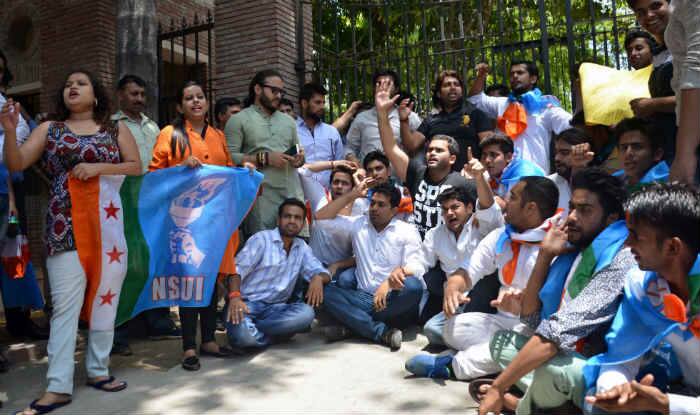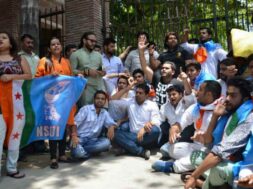
Manas Dasgupta
NEW DELHI, Jan 27: Delhi University’s Arts Faculty campus saw police action on Friday as students sought to screen the controversial BBC documentary on Prime Minister Narendra Modi and the 2002 Gujarat riots even as the government has imposed restrictions.
Students at Delhi University were dragged away by police from the campus as they sought to publicly screen the controversial documentary series. This came just two days after similar scenes were witnessed at Jawaharlal Nehru University (JNU) and Jamia Millia University in Delhi.
Student activists said the police acted violently even though the intention was for students to peacefully watch the documentary. They also alleged that “Sanghi goons” — reference to members of the BJP’s mentor body RSS and its wings — attacked those gathered for the event too. The DCP (North) Sagar Singh Kalsi said 24 students were detained and the situation is now “back to normal”.
University officials said no permission was sought for a public screening and there were also orders issued by the district administration against any mass gathering. DU Chief Proctor Rajni Abbi, who called the cops, saw justification in the police action. “Yes, students have been detained. Have they taken permission? When police have imposed Section 144, why have they collected?” she said. She alleged that the students were “not even interested” in showing the documentary. “They just want disruptive things.”
Around 24 students and activists belonging to National Students’ Union of India were detained outside Delhi University’s Arts Faculty, police said, adding that they were released by evening. An officer said that Section 144 of the CrPC has been imposed in the area to maintain law and order and large gatherings have been restricted.
Amid heavy deployment at Arts Faculty’s gate, students’ outfits had planned to the screen the documentary. The Congress-affiliated National Students Union of India had announced screening of the documentary at 4 pm, while Bhim Army Students’ Federation said that it would hold a screening outside the Arts Faculty at 5 pm.
According to Rajni Abbi, out of those who have been detained, their identity cards will be checked to determine if they’re students from DU. “If they’re from outside, police will take action, if they’re from DU, appropriate action will be taken against them,” she said. “Around 4 pm, students had gathered outside the gate to screen the said documentary, as it can cause disturb the peace in the area, they were asked to disperse, when they decided not to, we detained 24 students,” Kalsi said.
DCP Kalsi further said that some students tried going inside the campus and attempted to screen the documentary, however, they failed. “Later, a few more people gathered and police handled the law and order situation outside well. By 6 pm, the situation was normal. The students who went inside have also left,” Kalsi said.
Ajil K Binu, an NSUI activist, who was detained said, “we were peacefully trying to screen the documentary, however, we were detained by the police and the administration did not say anything.” Police said the action comes in days after similar incidents were reported at JNU and JMI over the screening of the documentary. An officer however said that Section 144 has been in place since December to maintain law and order ahead of Republic Day. “We made several announcements today regarding the order, the students were asked to disperse, however they did not,” he said.
Earlier in the day, students belonging to Student Federation of India had planned a mass screening of the documentary in Ambedkar University. Yashita, SFI’s Delhi State President, said the students and activists had planned the screening at 1 pm, however, the electricity was disconnected from the campus, she claimed.
According to AUD’s administration, they had not received any information regarding the screening. “Even the canteen area was shut for us to sit, the guards were told by the administration to stop the screening, and had even called the police,” she said, adding that the police requested the students to not disrupt the peace.
“We decided to go ahead with the screening even if they shut the electricity down, we put up QR codes and watched the documentary on our respective mobile phones and laptops,” Ms Yashita claimed. She alleged that students belonging to ABVP tried disrupting their gathering. “They played religious songs loudly, however, we continued watching in the film in support of students from JNU and JMI,” she said.
Earlier, 13 students from JMI were released after a day of detention by the Delhi police for protesting the ban on screening the documentary. An officer had said, “we’re afraid the students might disturb law and order on Republic Day, hence they were released a day later.
The two-part series, which references the 2002 Gujarat riots and recent incidents of communal violence, has been termed by the central government as false and motivated propaganda. The government has used emergency powers to force social media outlets such as YouTube and Twitter to take it down.
Ahead of screening large number of students — led by those belonging to Left parties and other Opposition parties — gathered at DU Arts Faculty area and protested imposition of Section 144 in the area to stop the screening. Clashes erupted as right-wing student groups allegedly came to protest against the event. Those wanting the screening raised slogans of “Delhi police, go back”, and the police began detaining some people who were allegedly “not students, but anti-social elements”.
“We were about to start the screening when Sanghi goons attacked us and started dragging those gathered for it. Police closed the gates and did not allow people to enter for the event,” said a student who had come for the screening from the DU-affiliated Hindu College. The DU official said holding a mass screening was the point of contention. “They can watch it at their homes; who’s stopping them?” said Rajni Abbi, adding that she suspected they were outsiders. About police violently dragging students, she said, “Why are they here, first of all? [The screening] is not allowed here.”
The screening attempt was at the latest of such protests events held across the country, including in Delhi, Chandigarh, Kolkata and Thiruvananthapuram. Opposition parties have slammed the BJP for trying to ban the documentary altogether. Student groups have led the protests. The BBC has defended the series as a “rigorously researched” piece of journalism that wants to highlight important issues.













